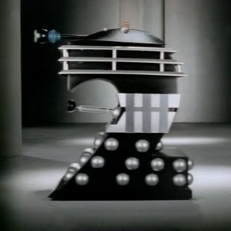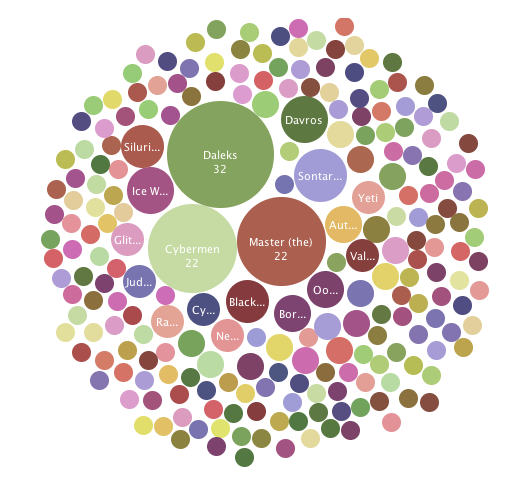This visualization of Doctor Who villains since 1963 will tell you:
Tag Archives: science fiction
Goodbye, Number Six
Patrick McGoohan died today. He’s best known for creating The Prisoner, possibly the only time a single person has been given carte blanche to write, direct, and star in a television program. It remains among the finest stories ever told. If you haven’t seen it, you’re missing out.
Who’s Number Two
I think I’ve finally figured out who Number Two is:

From a BBC 2 trailer in one of the the extras on Doctor Who and the Silurians (Amazon).
P.S. If this makes no sense to you, you must not be a fan of 1970s British sci-fi. If not, we can still be friends.
Exposé this
Forgive them for the hyperbolic description and for constructing the phrase “real-world pixels” for a moment and check out Oblong Industries’ g-speak. They designed the gestural user-interface in Minority Report — and it’s for real. Makes Exposé look like a cheap trick. (via Ross)
Move over, Roswell
This creepy story of the unexplained deaths of nine expert skiiers in the USSR in 1959 makes the Roswell tale, The X-Files, and The Thing sound dull by comparison:
Baffled investigators said the group died as a result of “a compelling unknown force” — and then abruptly closed the case and filed it as top secret.
New music genres to watch out for
Conversation between music nerds, overheard, 2037:
A: “What kinda music do you like?”
B: “Oh, mostly Folkwave and Waltzcore these days. I used to be into Dark Country, but then it got dumb.”
A: “Yeah, me too. I like a little Punk-Hop and Crackabilly, but you know, the scene is so tired.”
B: “When did this Soft Metal thing start getting popular again? It’s so, like, 2033.”
A: “That and Polkabilly. Nerds.”
B: “Laaame.”
Farscape’s loose ends
I just rewatched Farscape’s Peacekeeper Wars, the miniseries that followed the fourth season. The show was intended to run for five seasons, and the story was left unfinished after the fourth. The miniseries tried to finish up the story, but it left a lot of loose ends. (Don’t keep reading if you haven’t watched all of Farscape — the rest of this post contains some major spoilers.)
The other side of the race to the moon
After watching From the Earth to the Moon and In the Shadow of the Moon, I wondered whatever happened to the threat of a “red moon” that so motivated the US to land on the moon before 1970. Turns out the Soviet lunar program was very real. It never achieved real success largely due to interpersonal rivalries and bureaucratic territoriality, and was canceled as the Soviets lost interest in the program after Khrushchev (Хрущев) was ousted in 1964.
Update 2008-01-03: Red Moon Rising by Matthew Brzezinski is about the Soviet space program. Read the first chapter here.
Update 2008-01-18: Air & Space has some more lunar landers that never were.
The Dimwit Future Society
The World Future Society (complete with a particularly egregious use of Helvetica) has some choice tidbits about our future.
Forecast #1: Generation Y will migrate heavily overseas.
This one’s the only one that’s truly new to me; and it’s also already evident in my friends.
Forecast #2: Dwindling supplies of water in China will impact the global economy.
This one has a typo. The word “China” appears to have been inserted randomly in the middle of the sentence. Dwindling supplies of water everywhere have been impacting the global economy for years. The situation in the middle east is partly about Israel’s control of water supplies, and the shrinking and polluted Aral sea is affecting Kazakh and Uzbek industry.
Forecast #3: Workers will increasingly choose more time over more money.
Duuuh. On the first day of my 10th grade English class, in 1992, our teacher said “Your generation is different because you care more about time than about money.” That was a prediction in 1992. It’s a fact in 2007.
Forecast #4: We’ll incorporate wireless technology into our thought processing by 2030.
This one’s a howler. “Wireless” technology? For those of you who don’t know what “wireless” means, it means “without wires.” I don’t know about you, but my brain already processes thoughts and interacts with the rest of the world in a purely wireless fashion. Seems like they threw in the word “wireless” because so many people are using “wireless” as a generic term for “hi-tech.” Wireless is a communication channel; methods of transmitting information are not the same as sheer computational power or breakthrough human-computer interfaces. The latter two may eventually improve our thought processing; “wireless” technology will not impact it any more than a national postal service did.
Forecast #5: Children’s “nature deficit disorder” will grow as a health threat.
I was unaware of this acronym-ready “nature deficit disorder” catch phrase. But, uh, being in nature is good for you? And people are exposed to nature less now that they live in big urban areas? NEWSFLASH!
Forecast #6: Outlook for Asia: China for the short term, India for the long term.
Duuuh.
Forecast #7: The robotic workforce will change how bosses value employees.
Reminiscent of any familiar argument you’ve heard before? Oh, this is a real concern because big corporations value their employees so highly, right?
Forecast #8: The costs of global-warming-related disasters will reach $150 billion per year.
Guys, for everybody except the Republican Party, global warming was a prediction fifteen years ago. Today, it’s a fact, and the economic impacts are obvious.
Forecast #9: Companies will see the age range of their workers span four generations.
Wow, you read the US Census.
Forecast #10: A rise of disabled Americans will strain public transportation systems.
Wow, you read the US Census, and you’ve been driving to work so long you haven’t noticed that public transportation systems are already strained beyond the breaking point, not just for disabled people, but for everybody.
Predicting the future is hard. Your obvious and vacuous projections of current trends don’t impress me.
The X-Files, dog version
Smithsonian magazine reprinted this snippet by Simon Rich, previously printed in the Harvard Lampoon. Makes me feel better about alien abductions for sure.
